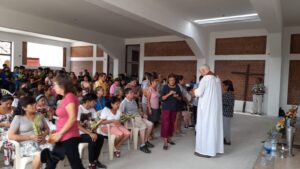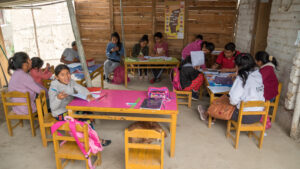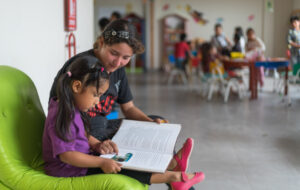Fr Ed O’Connell considers why so many voters in different parts of the world today feel such apathy and argues that we must all discern how to play an active part in society.
It certainly has become a small world! I was talking recently, on Zoom, with young adults from the parish where I worked in Peru. I asked them about the political situation and what could be done to improve the life of the ordinary folk. Their reply was stark. They were and are disenchanted with politicians who are caught up with their own interests or the interests or those who put up the money for them to be politicians.
These young people are not interested in getting involved, other than individually showing solidarity to those in need or maybe signing petitions in defence of those suffering human rights abuses.
Then the other week, in South London, I was talking to an old school friend from the early sixties. When I asked him about the forthcoming elections, he said he thought he would not vote, as he sees no difference between the parties and little chance of change. In both cases, Peru and Britain, it is not so much a case of apathy but rather that democracy in practice seems to have let them down.
Politicians seem to be behaving more according to their own needs and interests and have lost contact with the sufferings of ordinary folk. In short, there is little to no confidence in them.

Fr Ed O’Connell at Mass in his parish in Peru.
I have had an interest in politics since my days in the Young Christian Workers (YCW) in Brixton, way back in the sixties. Many YCW members in the fifties and sixties, formed in a “see, judge and act” methodology, went on to be local councillors and active trade unionists and for me, I discovered my vocation to be a missionary priest. They, like me, got their strength and direction from their faith.
The use of Gospel reflection and a study of the Social Teaching of the Church gave us our lead. I have always been drawn to the concept of the Common Good, defined by the Bishops of England and Wales as “the whole network of social conditions which enable humans – individuals and groups – to flourish and live a fully, genuinely human life.”
This comes about by implementing the need to respect the human dignity of all and using the values of solidarity and subsidiarity to guide decision-making.

The homework club in Cuz del Norte.
Many countries around the world face elections this year or next. I can only hope that people will take time to review the meaning of the Common Good, and, so as to achieve it, see the need to be active citizens in some way or another within their societies. And when the time comes to vote, to look out not only for their own well-being but also for the well-being of others too, especially the most vulnerable.
It is not just about tax cuts, it is also about investing to improve our services: health, education, public housing, social services, as well as demanding meaningful action on climate change and fair and just treatment of migrants and refugees.
We can gain insight and strength from the struggles Jesus faced in getting to know His Father’s Will. The Temptations showed Jesus turning down power, wealth and self-importance for Himself. He chose the path of humility, poverty in the form of a simple lifestyle and the service of others instead of self-serving. Our call to follow Jesus, as Christians, no matter our age, is an invitation to assume His attitudes and Way of life.
How we do it is a challenge each has to face and do so in the context of our relationship with God, with others and with our common home, the planet.

The reading club in the Warmi Huasi centre.
May the Spirit of Jesus Christ be with each of us, as we discern how to play an active part in society, as the responsibility for politics is not just with the politicians. In recent years in Peru, I worked with the head teacher of Manuel Duato Special Needs School to help prepare parents to get involved in advocacy work: For the parents to talk with officials, councillors and mayors about the need for support of their special-needs children and how the councils can help provide facilities, training programmes and leisure activities for their children.
More recently the team at Warmi Huasi, a small NGO I set up with others to accompany families living in poverty, accompanies and enables children and young people to have a voice at local council level, so that the local mayor and councillors hear the needs of the young and the plans the young have to improve their lives and that of their communities.
It is slowly working, local councils are beginning to see the value of young people’s involvement. And maybe it is also the first step to breaking apathy and getting a new generation involved in politics, which in the end is about achieving for all the basics of life.
Fr Ed O’Connell was ordained in 1973. He worked with marginalised children and women in Peru. He is now based in Britain.

